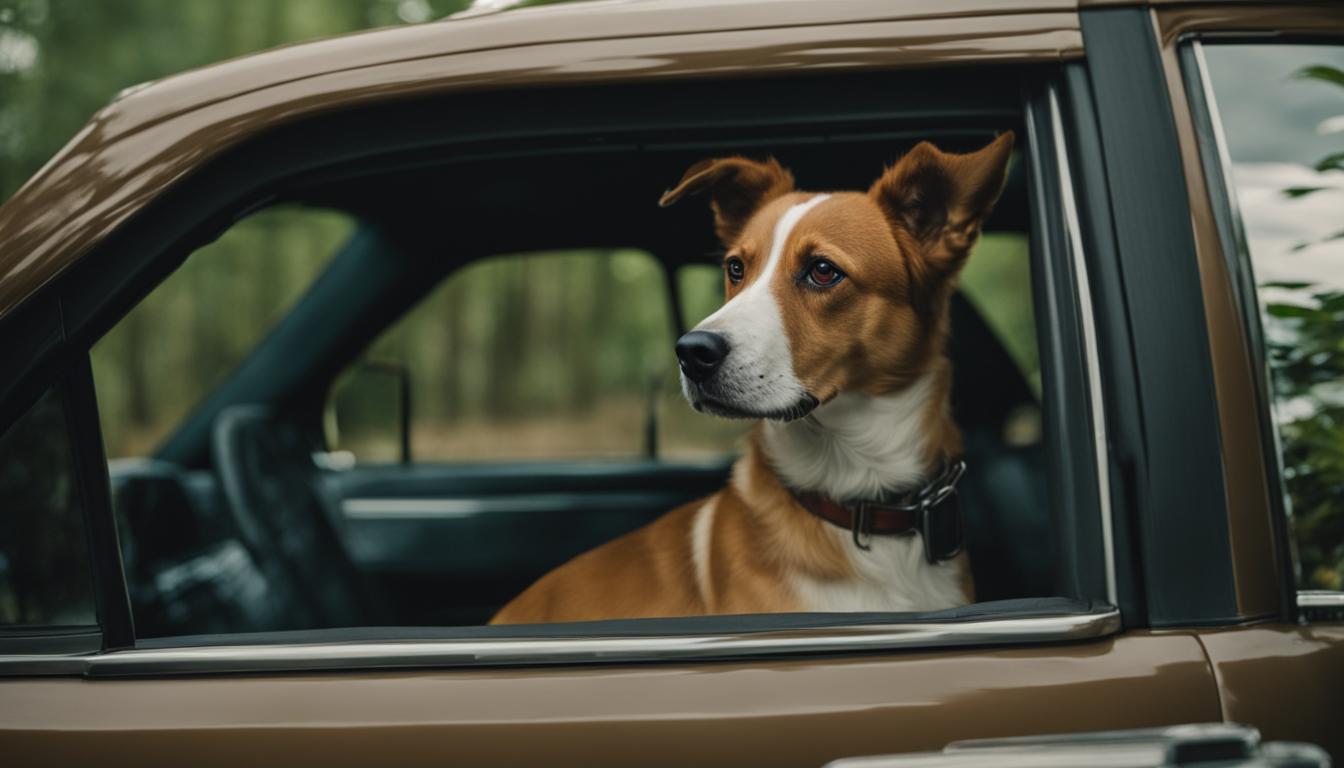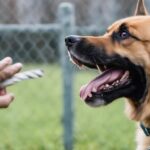Many dog owners have experienced the frustration of their furry friends pooping in the car. It can make travel stressful and messy, leaving us wondering why this behavior occurs. The truth is, there are several reasons why dogs may poop in the car, and understanding these reasons is crucial in finding solutions for a more enjoyable travel experience.
So let's dive into why does my dog poop in the car ……
When it comes to car anxiety in dogs, it's important to consider factors such as motion sickness, past negative experiences, and general anxiety. Additionally, dogs may feel the need to mark their territory in an unfamiliar environment, or they may become frustrated from a lack of exercise during long journeys.
To address these issues and prevent accidents in the car, dog travel training is essential. By teaching your dog to love the car and associate it with positive experiences, you can help alleviate their anxiety. It's also important to manage their motion sickness, create a comfortable environment, and address any underlying medical issues that may contribute to the problem.
Key Takeaways:
- Car anxiety in dogs can lead to accidents in the car, but it can be addressed through training and creating positive associations.
- Motion sickness and unfamiliar surroundings can also contribute to dogs pooping in the car, so taking preventive measures is crucial.
- Dogs may feel the need to mark their territory or become frustrated due to a lack of exercise during long journeys, leading to accidents in the car.
- Understanding and addressing the underlying causes of car anxiety is important for a more enjoyable travel experience for both the dog and the owner.
- Dog travel training, managing motion sickness, and addressing medical issues are key to preventing accidents in the car.
- Gastrointestinal problems, digestive disorders, or infections can lead to dogs pooping in the car.
Teach Your Dog to Love the Car
One of the key steps in addressing dog car travel problems, such as dogs pooping in the car, is to train them to associate the car with positive experiences. This can be achieved through desensitization and counter-conditioning techniques, which gradually help dogs overcome their fear or anxiety and learn to love car rides.
Desensitization involves slowly introducing the dog to the car in a controlled and positive manner. Start by keeping the car at a distance and gradually decrease the distance over time. Allow the dog to observe the car from a safe distance, rewarding calm behavior with treats and praise.
Once the dog becomes comfortable with the presence of the car, you can move on to the next step, which is introducing them to the interior of the car. Begin by opening the car doors and allowing the dog to investigate from the outside. Reward any positive interaction or curious behavior.
After several successful encounters outside the car, it's time to introduce your dog to sitting inside the car. You may want to start with just having them sit in the parked car for short periods, gradually increasing the duration as they become more comfortable.
Remember, patience is key during this process. Each dog progresses differently, so allow them to set the pace and provide plenty of positive reinforcement along the way.
Counter-conditioning is the next step in teaching your dog to love the car. This involves pairing the car with positive experiences and rewards. Start by offering treats or playtime near the car, gradually moving closer until the dog feels comfortable getting inside. Provide plenty of praise and rewards to reinforce the positive association.
As your dog becomes more accustomed to the car and starts to enjoy the experience, you can begin taking them on short car rides to further reinforce the positive association. Make sure to offer treats, toys, or other rewards during the ride to keep their focus on the positive experience.
By using desensitization and counter-conditioning techniques, you can transform your dog's perception of car travel from a source of anxiety to an enjoyable adventure. With consistent training and positive reinforcement, you can help your dog overcome their car travel problems and prevent them from pooping in the car.
Benefits of Teaching Your Dog to Love the Car
Teaching your dog to love the car has numerous benefits, including:
- Reduced anxiety and stress during car rides
- Elimination of car accidents and unwanted behaviors
- Increased opportunities for travel and outdoor adventures
- Enhanced bond and trust between you and your dog
Teach Your Dog to Enjoy Riding in the Car
Once your dog is comfortable being in the car, it's time to introduce motion to the training. Start with short distances and gradually increase the duration of the drives as your dog becomes more accustomed to traveling. This step is crucial in helping your dog associate car rides with positive experiences.
During car rides, make sure to provide rewards, praise, and positive reinforcement. This can be in the form of treats, verbal encouragement, or even a favorite toy. By consistently rewarding your dog for their calm and relaxed behavior in the car, you can reinforce the idea that car rides are enjoyable.
Choosing destinations that your dog enjoys can further enhance their experience in the car. If your dog loves the park or a specific hiking trail, consider making that your destination. This not only provides a positive incentive for your dog to enjoy car rides but also helps reduce anxiety by associating the car with something they love.
Remember, consistency and patience are key when training your dog to enjoy car rides. Some dogs may require more time and practice than others, but with the right approach, you can help your furry friend feel comfortable and relaxed during car travel.
Prevent Dog Motion Sickness
Motion sickness can be a common problem for dogs, especially puppies. However, some dogs may continue to experience it even as they mature. To ensure a smooth and comfortable car journey for your furry friend, here are some important tips to prevent dog car sickness:
- Keep the car cool: Maintaining a cool temperature in the car can help alleviate motion sickness. Consider opening a window or using the air conditioning to provide a fresh and comfortable environment for your dog.
- Provide fresh air circulation: Good ventilation is crucial to prevent your dog from feeling nauseous during the ride. Ensure that the car is well-ventilated and that fresh air is circulating.
- Limit food and water intake: Feeding your dog a light meal a few hours before the trip can help reduce the chances of motion sickness. Avoid feeding your dog a full meal or giving them a large amount of water before the journey.
- Consult a vet: If your dog experiences severe motion sickness, consulting a veterinarian can be beneficial. They may recommend medications or remedies that can help alleviate the symptoms and make car travel more comfortable for your dog.
- Exercise your dog before the trip: Engaging your dog in physical exercise before the car ride can help tire them out, reducing the likelihood of motion sickness during the journey.
- Consider using dog pheromones: Dog pheromone products, such as sprays or diffusers, can help create a calm and relaxed environment in the car. These pheromones mimic the natural calming scents that dogs release, helping to reduce anxiety and motion sickness.
By implementing these preventive measures, you can significantly reduce the risk of dog car sickness and ensure a stress-free and enjoyable travel experience for your canine companion.
| Preventive Measures | Benefits |
|---|---|
| Keeping the car cool | Reduces discomfort and alleviates motion sickness |
| Providing fresh air circulation | Prevents feelings of nausea and improves ventilation |
| Limiting food and water intake | Reduces the chances of vomiting and discomfort |
| Consulting a vet | Obtaining professional advice and potential medication |
| Exercising the dog before the trip | Tiring the dog out, reducing the likelihood of motion sickness |
| Using dog pheromones | Creating a calm and relaxed environment during car rides |
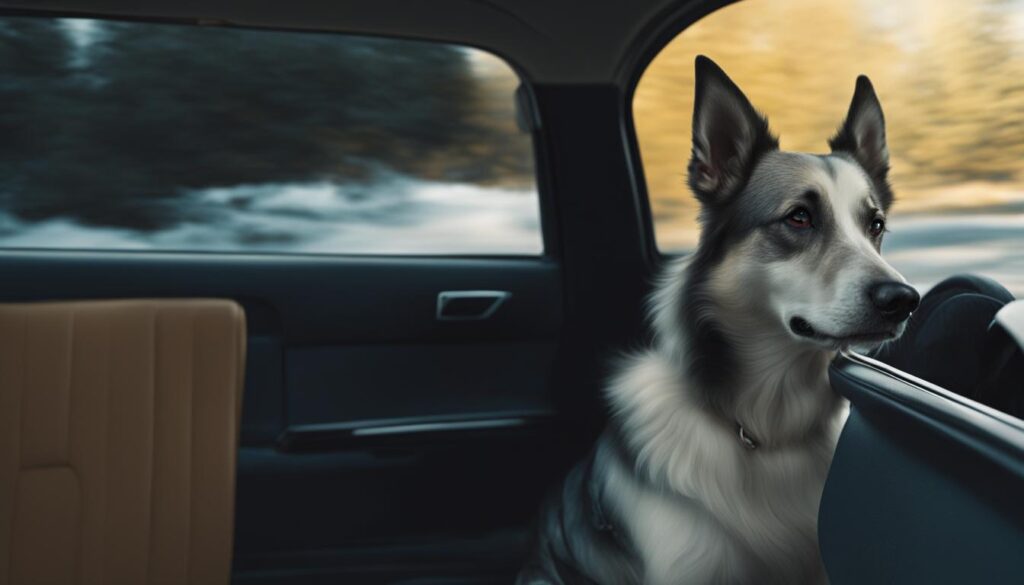

Natural Instincts
When it comes to understanding why dogs poop in the car, we need to take a closer look at their natural instincts. Dogs are territorial animals, and they may view the car as an extension of their territory. This can lead to marking behavior and accidents in the car.
Additionally, certain dogs have an instinct to relieve themselves in unfamiliar areas or areas with different smells. The scent of a car, which is a confined and enclosed space, can trigger this instinct and cause dogs to poop in the car.
By understanding these instincts, we can address the issue and take preventive measures to prevent accidents in the car.
Creative Solutions for Preventing Dog Accidents in the Car
To prevent accidents caused by instincts, consider implementing the following strategies:
- Carry familiar scents: Bring items with familiar scents, such as the dog's bed or blankets, to help create a sense of familiarity and reduce the need for marking.
- Regular bathroom breaks: Take regular bathroom breaks before and during car rides to ensure that your dog has ample opportunity to relieve themselves outside the car.
- Gradual exposure: Gradually expose your dog to the car environment, starting with short trips and gradually increasing the duration. This can help desensitize them to the unfamiliar surroundings and reduce accidents.
By addressing your dog's instincts and implementing these preventive measures, you can minimize accidents and create a more pleasant car travel experience for both you and your furry friend.
Anxiety and Stress
Anxiety and stress can play a significant role in causing dogs to poop in the car. When dogs experience heightened emotions, they may react by having accidents. These emotions can stem from previous negative experiences, motion sickness, or separation anxiety.
To address this issue, it is crucial to identify and address the underlying causes of anxiety and stress. By doing so, we can help our dogs feel more comfortable and reduce accidents in the car.
One effective approach is to provide positive reinforcement and create a safe and calming environment during car rides. Consistent dog travel training can help desensitize dogs to the stressors of car travel and build their confidence. Gradual exposure, along with rewards and praise, can help dogs associate car rides with positive experiences.
Additionally, offering familiar and comforting items such as their favorite blanket or toy can help reduce anxiety. Creating a soothing atmosphere with calming music or pheromone sprays can also contribute to a more relaxing car environment.
Taking frequent breaks during long trips allows dogs to stretch their legs and relieve themselves, reducing the likelihood of accidents due to stress or anxiety. Planning rest stops in dog-friendly areas with open spaces can provide dogs with the opportunity to relax and release any pent-up tension.
Tips to Reduce Car Anxiety in Dogs:
- Gradually introduce the car to your dog and associate it with positive experiences.
- Offer rewards and praise during car rides to create positive associations.
- Provide familiar and comforting items such as blankets or toys.
- Create a soothing atmosphere with calming music or pheromone sprays.
- Take frequent breaks during long trips to allow dogs to relieve themselves and stretch their legs.
Quote:
I have found that consistent training and creating a calming environment in the car can make a world of difference for anxious dogs. By understanding and addressing their anxiety, we can help them feel more at ease during car rides and prevent accidents.
Remember, each dog is unique, and it may take time and patience to address their anxiety and stress-related behaviors. Consulting with a professional dog trainer or veterinarian can provide valuable guidance and support in this process.
| Causes of Car Anxiety in Dogs | Preventive Measures |
|---|---|
| Negative experiences in the car | Provide positive reinforcement and create a safe car environment |
| Motion sickness | Consult a veterinarian for medication or natural remedies |
| Separation anxiety | Introduce desensitization techniques and provide familiar comfort items |
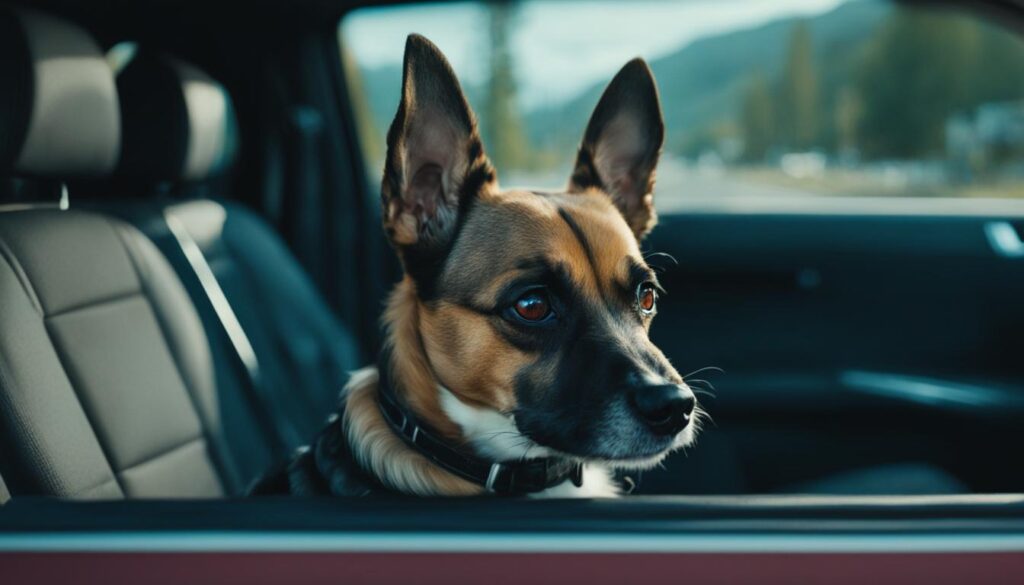

Medical Issues
Medical issues can be a contributing factor to dogs pooping in the car. Gastrointestinal problems, digestive disorders, or infections can affect a dog's bowel movements and result in accidents. If your dog consistently poops in the car and exhibits other concerning symptoms, it is important to consult a veterinarian to rule out any underlying health conditions.
If you notice your dog experiencing frequent accidents in the car, accompanied by signs such as diarrhea, vomiting, loss of appetite, or lethargy, it could be indicative of an underlying medical issue. These issues may cause discomfort or uncontrollable bowel movements, leading to accidents during car travel.
When addressing dog accidents in the car, it is crucial to determine if there is an underlying medical cause. A veterinarian will be able to conduct a thorough examination and recommend appropriate tests or treatment. By addressing the medical issue, you can help prevent further accidents and ensure your dog's well-being during car travel.
Remember, prevention and proactive care are key to maintaining your dog's overall health and safety while traveling. Regular veterinary check-ups and open communication with your veterinarian are essential in identifying and addressing any medical issues that may contribute to accidents in the car.
Unfamiliar Environment
Dogs may experience stress or anxiety when traveling in an unfamiliar environment, which can lead to accidents in the car. The change in smells, sounds, and the confined space of the car can make some dogs feel uneasy and trigger the need to relieve themselves.
To prevent accidents caused by an unfamiliar environment, gradual acclimation to the car is important. Start by introducing your dog to the car in a calm and positive manner. Allow them to explore the car while providing treats and praise to create positive associations.
Here are some car travel tips for dogs to help them adjust to unfamiliar environments:
- Take short trips to familiarize your dog with different travel routes and destinations.
- Bring familiar scents, such as their favorite blanket or toy, to provide comfort during the journey.
- Play soothing music or use calming pheromones to create a relaxing atmosphere in the car.
- Ensure proper ventilation and fresh air circulation to help alleviate any discomfort your dog may feel.
By gradually introducing your dog to new environments and creating positive associations with the car, you can help reduce their anxiety and prevent accidents during travel.
Longer and Tiresome Journeys
Dogs may poop in the car during long journeys if they become tired or exhausted. It is important to take frequent breaks and allow the dog to relieve themselves outside the car to prevent accidents. Ensuring that the dog is comfortable and not overly fatigued during long car rides can help minimize accidents.
When planning a long car journey with your dog, consider the following car travel tips:
- Take breaks every 2-3 hours to allow your dog to stretch their legs and relieve themselves. Find safe and appropriate areas for them to do their business.
- Bring water and snacks to keep your dog hydrated and nourished throughout the journey. Avoid giving them a full meal before the trip to reduce the chances of car sickness.
- Make the car ride comfortable for your dog by providing them with a cozy bed or blanket to lie on. They should have enough space to move around and change positions.
- Consider using a travel crate or harness to secure your dog during the journey. This will ensure their safety and prevent them from roaming around the car.
- Play calming music or use essential oils like lavender to create a soothing environment in the car.
By following these car travel tips for dogs, you can help prevent accidents and make long journeys more enjoyable for your furry friend.
| Car Travel Tips for Dogs | Benefits |
|---|---|
| Take breaks every 2-3 hours | Allows your dog to stretch their legs and relieve themselves |
| Bring water and snacks | Keeps your dog hydrated and nourished |
| Provide a comfortable space | Makes the car ride more enjoyable for your dog |
| Use a travel crate or harness | Ensures your dog's safety and prevents roaming |
| Play calming music or use essential oils | Creates a soothing environment in the car |
Frustration
Dogs may poop in the car out of frustration, especially if they are not able to go outside for walks or exercise.
Providing the dog with opportunities to go for walks before getting in the car can help prevent accidents. Addressing the dog's need for physical activity and mental stimulation can also help reduce frustration and prevent accidents in the car.
Regular exercise and playtime can help release any pent-up energy and prevent the dog from becoming restless or frustrated during car rides. This can include activities such as walks, runs, play sessions, or interactive toys that keep the dog engaged and stimulated.
It's important to keep in mind that dogs are active animals that thrive on physical activity and mental stimulation. By fulfilling their needs, we can create a calmer and more relaxed environment for car travel, reducing the likelihood of accidents due to frustration.
Remember, a tired and content dog is less likely to engage in unwanted behaviors and more likely to enjoy the car ride without any accidents.
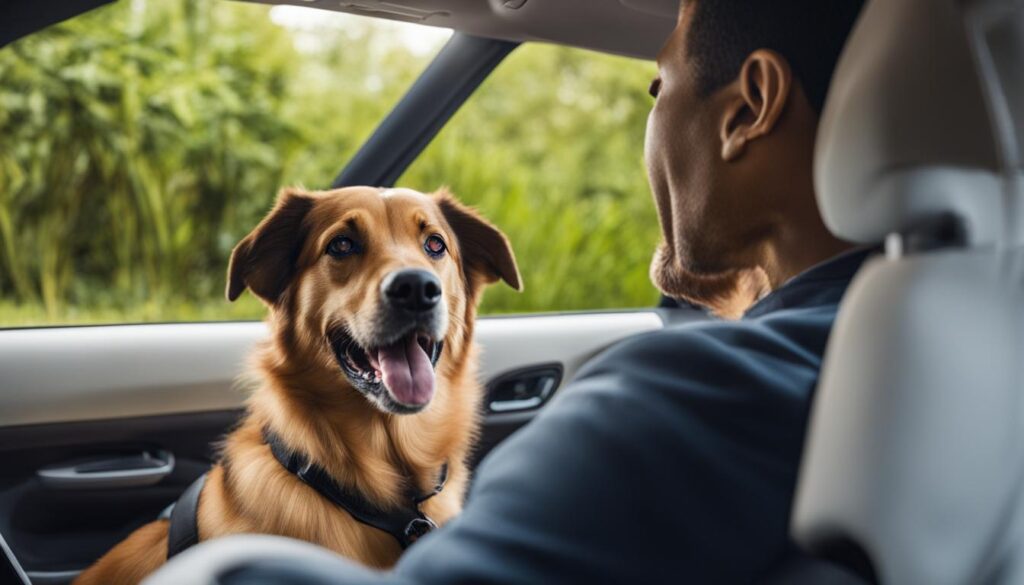

Conclusion
In conclusion, understanding why dogs poop in the car is crucial for preventing accidents and creating a positive travel experience. Various factors such as anxiety, motion sickness, unfamiliar environments, frustration, and medical issues can contribute to this behavior.
By implementing appropriate training techniques and preventive measures, dog owners can address these underlying causes. Desensitization and counter-conditioning can help dogs develop a positive association with the car, while frequent breaks and exercise before car rides can reduce frustration and fatigue.
Consistency, patience, and seeking professional advice when needed are key to effectively solving the problem of dogs pooping in the car. With proper training and understanding, dog owners can ensure a safer and more enjoyable travel experience for both themselves and their furry companions.
FAQ
Why does my dog poop in the car?
There are several possible reasons why a dog may poop in the car, including anxiety, motion sickness, unfamiliar surroundings, frustration, or medical issues.
How can I stop my dog from pooping in the car?
To prevent your dog from pooping in the car, you can use desensitization and counter-conditioning techniques to help them associate the car with positive experiences. Gradual acclimation, rewarding good behavior, and providing breaks for bathroom breaks can also be helpful.
How can I teach my dog to love the car?
Teaching your dog to love the car involves gradually introducing them to the car and creating positive associations with it. Start with short distances and reward your dog for calm behavior during car rides. Making car rides enjoyable through treats, praise, and destinations your dog enjoys can also help.
How can I prevent dog motion sickness during car rides?
To prevent dog motion sickness, you can ensure the car is cool and well-ventilated, limit food and water intake before the trip, exercise your dog before the journey, and consult with a vet for possible medications or remedies. Using dog pheromones to relax them during car rides may also be helpful.
Why do dogs have natural instincts to poop in the car?
Dogs may have natural instincts to poop in the car due to marking behavior, the scent of a car triggering the need to relieve themselves, or a preference for unfamiliar areas or areas with different smells.
How can I help my dog with car anxiety and stress?
Addressing the root causes of car anxiety and stress, such as previous negative experiences, separation anxiety, or motion sickness, can help reduce accidents in the car. Creating a positive association with the car, providing comfort, and seeking professional advice if needed, can all contribute to your dog feeling more comfortable during car rides.
Can medical issues cause dogs to poop in the car?
Yes, medical issues such as gastrointestinal problems, digestive disorders, or infections can affect a dog's bowel movements and lead to accidents in the car. If you notice consistent pooping in the car accompanied by other concerning symptoms, it is important to consult a veterinarian to rule out any underlying health conditions.
Why do dogs poop in the car due to unfamiliar environments?
Dogs may poop in the car when faced with unfamiliar surroundings because of the change in smells, sounds, and the confined space of the car, which can make them feel uneasy and trigger the need to relieve themselves.
How can I prevent accidents during longer car journeys?
To prevent accidents during longer car journeys, it is important to take frequent breaks and allow your dog to relieve themselves outside the car. Ensuring your dog is comfortable and not overly fatigued during the trip can help minimize accidents.
Can frustration lead to dogs pooping in the car?
Yes, frustration, especially if a dog is unable to go for walks or exercise, can cause them to poop in the car. Providing opportunities for physical activity and mental stimulation, as well as addressing the dog's needs, can help reduce frustration and prevent accidents in the car.
How can I solve the problem of my dog pooping in the car?
Understanding the underlying causes and implementing appropriate training and preventive measures can help solve the problem of a dog pooping in the car. This includes addressing anxiety and stress, creating positive associations with the car, providing breaks for bathroom breaks, and seeking professional advice if needed.

